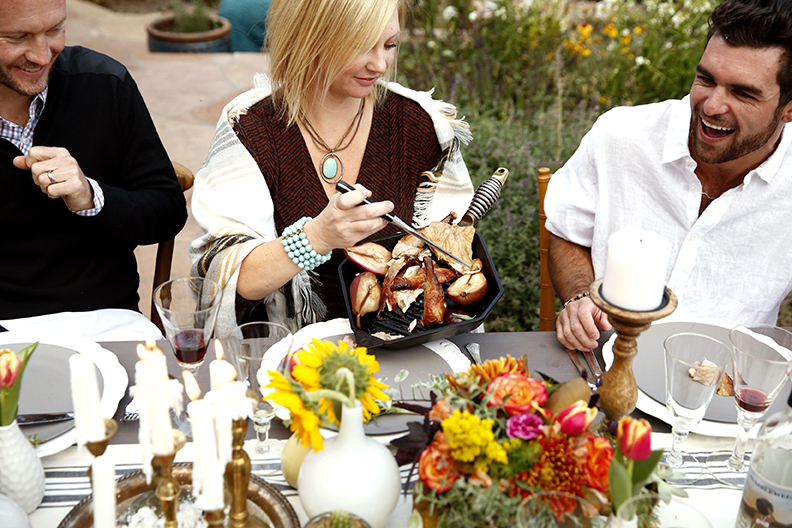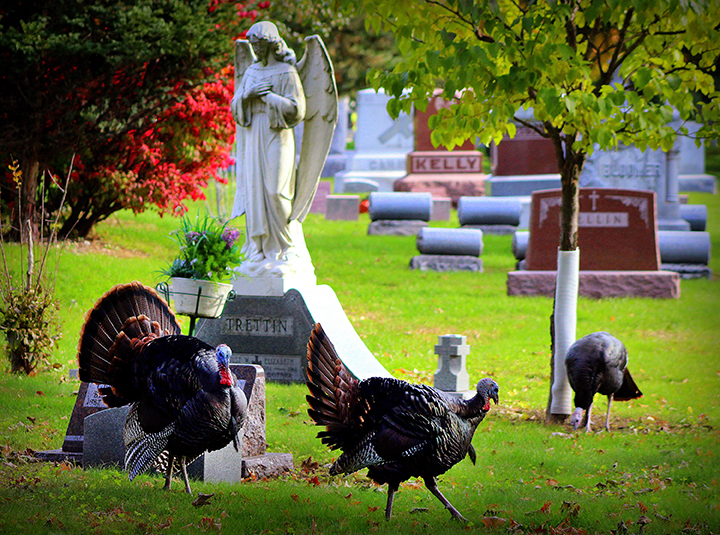
By Fr. Michael Accinni Reinhardt
The Catholic Sun
Thanksgiving Day Prayer
Lord, we thank you
for the goodness of our people
and for the spirit of justice
that fills this nation.
We thank you for the beauty and fullness of the
land and the challenge of the cities.We thank you for our work and our rest,
for one another, and for our homes.
We thank you, Lord:
accept our thanksgiving on this day.
We pray and give thanks through Jesus Christ our Lord.Amen.
The month of November stirs-up the heart as thoughts of a bountiful table set, and a turkey with all the trimmings prepared, attending Thanksgiving Day Mass at the parish and the glimpse of the Macy’s Thanksgiving Day Parade or a football game all make for a well-planned day. It all sounds fine and dandy until the extended family shows up including that embarrassing aunt or uncle who seldom visit, but when they do are the cause of grief.
For some families the prospect of hosting the family Thanksgiving Day dinner is incredibly daunting, and a cause for sleepless nights and uneasiness. Such feelings are really unnecessary especially if the right mind-set is in place, as well as the proper spiritual disposition set like the impeccable table for the occasion.
In a recent survey conducted by St. Leo University, in St. Leo, Florida, people who participated in the study affirmed that there are higher percentages of stress among family members during holiday gatherings such as Thanksgiving.
The source of such distress could be caused from past disagreements, family conflict or change in religious practices or political views of certain family members, but it seems that the familial bond still holds firm as the majority of family members with such issues still find it in their heart to show-up to Thanksgiving dinner.
For many in the survey, the Thanksgiving Day celebration is not the time for discussing controversial topics, or focusing upon religious difference, but rather the gift of the family, spending moments with a grandparent, or aunt, uncle or cousin can provide a great sense of heritage.
According to the St. Leo University study, nearly half of Americans polled will spend Thanksgiving together. Nearly one-third say that tensions play a role in how they plan to host or join in such holiday gatherings. It was determined that the extent of a generational gap at the Thanksgiving table could immensely impact the table talk. Most Americans say that for the occasion they will put away the grudges and indifferences and pass the cranberry sauce.
Holiday gatherings are an important part of family life, and affirm our relationships, sense of history, and connection. Families come in all sorts of packages with various levels of functional dysfunction for which they only know how to cope.
One might say that God does in fact have a marvelous sense of humor, by creating the families He has. In life people can most often choose who they associate with, or become acquaintances or friends with, who they even work with, but being born or formally adopted into a certain family is a whole other story.
Tradition holds that in the autumn of 1621, the Plymouth colonists and Wampanoag Indians shared an autumn harvest feast together. This is attributed to being one of the first Thanksgiving celebrations nearly four centuries ago. In the days of the early colonists, days of thanksgiving were held independently.
It was not until the year 1863 in the midst of the Civil War, that President Abraham Lincoln proclaimed a national Thanksgiving Day to be held each November. The appropriateness of a national holiday of Thanksgiving could not have come at a better time, as the Civil War wreaked havoc upon an emerging nation. Families were divided as well as the country.

“With malice toward none, with charity for all, with firmness in the right, as God gives us to see the right, let us strive on to finish the work we are in to bind up the nation’s wounds,” Abraham Lincoln stated in his proclamation. History teaches as she does, that Thanksgiving is truly a holiday of healing and quiet pause, to seek the good in all things and realize the blessings that are bestowed in the midst of adversity and struggle.
The famous voyage of the Mayflower began in September of 1620 in Plymouth, England, setting sail for the new world with 102 passengers that included an assortment of religious separatists seeking religious freedom, prosperity and land ownership. After 66 days at sea, the early pilgrims set anchor at the tip of present day Cape Cod, Massachusetts, then later established the Village of Plymouth across the bay.
Only half of the original passengers of the Mayflower would live to see their first spring in the new world as they succumbed to the elements and disease of that first New England winter. The early pilgrims and the Wampanoag people lived in harmony for more than 50 years as one of the long-standing examples of shared respect between European colonists and Native Americans. Living in the early colonies was rough for the pilgrims, and the practice of Thanksgiving celebrations annually became part of the early tradition, especially in New England. In the southern colonies the idea of Thanksgiving would not become etched in history until the Civil War.
The details of history regarding when the first Thanksgiving occurred really don’t matter. Historians continue to debate the facts, and even attribute an early Thanksgiving in the earliest Catholic settlement of America at St. Augustine, Florida. In 1565 Spanish explorer Pedro Menendez de Avile invited members of the local Timucua tribe to a dinner, after holding Mass to thank God for his crew’s safe arrival. The importance is the fact that these early settlers stopped their work and paused to give thanks to God.
Thanksgiving Day is in contemporary time the pause that is necessary. The pause is for a time of silent reflection, sharing and realizing that even in the face of adversity there are many gifts attributed to God’s providential care.
The nation is divided politically, the Church is wounded by the sins of abuse, yet God continues to write straight with crooked lines, and to marvel at His work is what Thanksgiving is all about.






